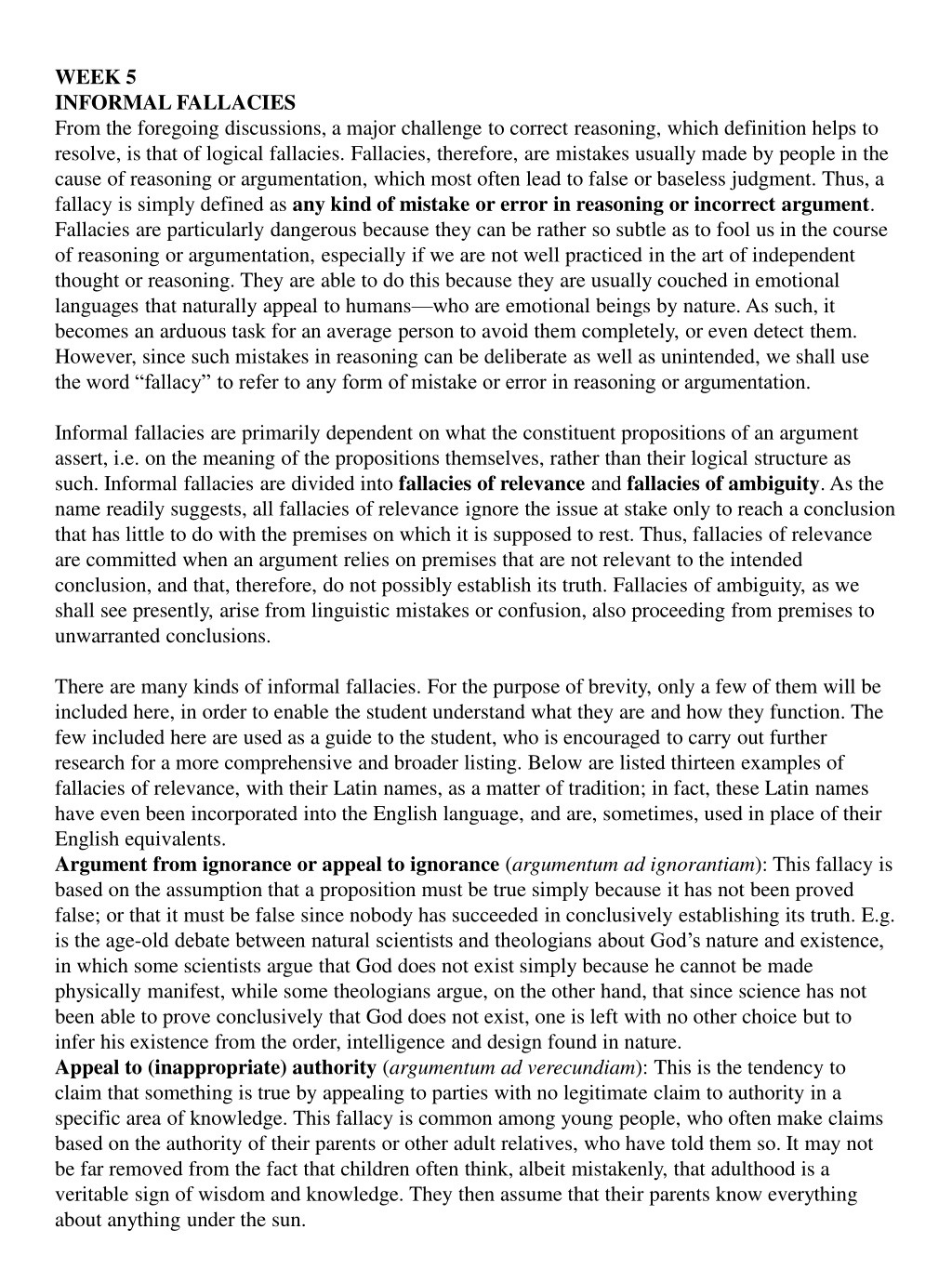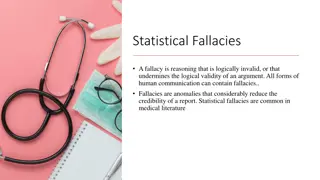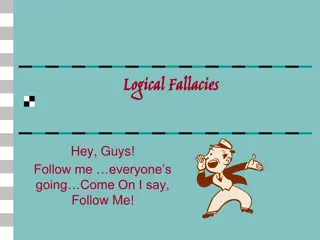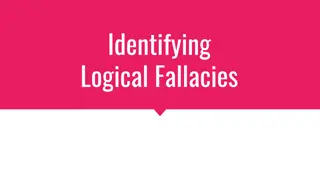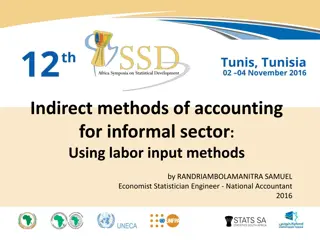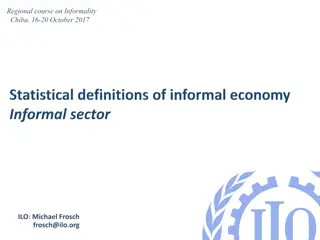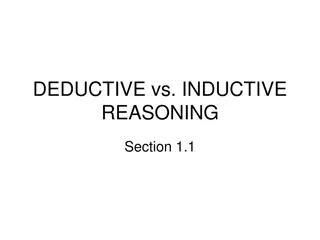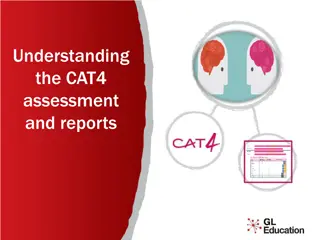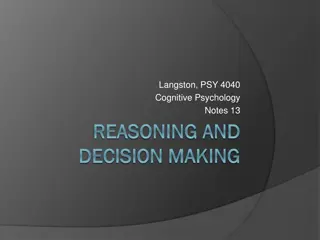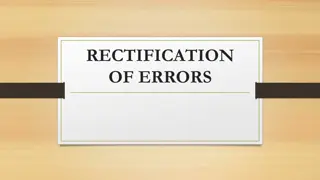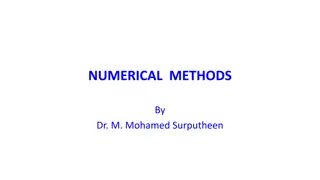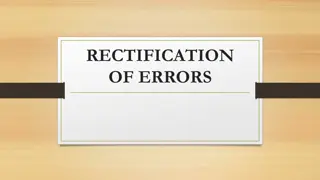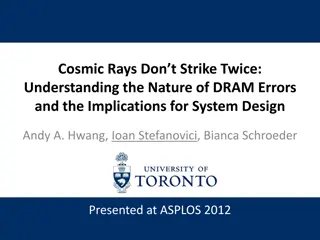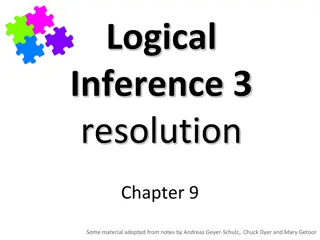Understanding Informal Fallacies: Common Logical Errors in Reasoning
Informal fallacies are mistakes in reasoning or argumentation that can lead to false judgments. They can be subtle and appeal to emotions, making them challenging to avoid. Fallacies of relevance and ambiguity are common types. Examples include argument from ignorance, appeal to authority, and appeal to the populace. Recognizing and understanding these fallacies is essential for logical thinking.
Uploaded on Sep 22, 2024 | 0 Views
Download Presentation

Please find below an Image/Link to download the presentation.
The content on the website is provided AS IS for your information and personal use only. It may not be sold, licensed, or shared on other websites without obtaining consent from the author. Download presentation by click this link. If you encounter any issues during the download, it is possible that the publisher has removed the file from their server.
E N D
Presentation Transcript
WEEK 5 INFORMAL FALLACIES From the foregoing discussions, a major challenge to correct reasoning, which definition helps to resolve, is that of logical fallacies. Fallacies, therefore, are mistakes usually made by people in the cause of reasoning or argumentation, which most often lead to false or baseless judgment. Thus, a fallacy is simply defined as any kind of mistake or error in reasoning or incorrect argument. Fallacies are particularly dangerous because they can be rather so subtle as to fool us in the course of reasoning or argumentation, especially if we are not well practiced in the art of independent thought or reasoning. They are able to do this because they are usually couched in emotional languages that naturally appeal to humans who are emotional beings by nature. As such, it becomes an arduous task for an average person to avoid them completely, or even detect them. However, since such mistakes in reasoning can be deliberate as well as unintended, we shall use the word fallacy to refer to any form of mistake or error in reasoning or argumentation. Informal fallacies are primarily dependent on what the constituent propositions of an argument assert, i.e. on the meaning of the propositions themselves, rather than their logical structure as such. Informal fallacies are divided into fallacies of relevance and fallacies of ambiguity. As the name readily suggests, all fallacies of relevance ignore the issue at stake only to reach a conclusion that has little to do with the premises on which it is supposed to rest. Thus, fallacies of relevance are committed when an argument relies on premises that are not relevant to the intended conclusion, and that, therefore, do not possibly establish its truth. Fallacies of ambiguity, as we shall see presently, arise from linguistic mistakes or confusion, also proceeding from premises to unwarranted conclusions. There are many kinds of informal fallacies. For the purpose of brevity, only a few of them will be included here, in order to enable the student understand what they are and how they function. The few included here are used as a guide to the student, who is encouraged to carry out further research for a more comprehensive and broader listing. Below are listed thirteen examples of fallacies of relevance, with their Latin names, as a matter of tradition; in fact, these Latin names have even been incorporated into the English language, and are, sometimes, used in place of their English equivalents. Argument from ignorance or appeal to ignorance (argumentum ad ignorantiam): This fallacy is based on the assumption that a proposition must be true simply because it has not been proved false; or that it must be false since nobody has succeeded in conclusively establishing its truth. E.g. is the age-old debate between natural scientists and theologians about God s nature and existence, in which some scientists argue that God does not exist simply because he cannot be made physically manifest, while some theologians argue, on the other hand, that since science has not been able to prove conclusively that God does not exist, one is left with no other choice but to infer his existence from the order, intelligence and design found in nature. Appeal to (inappropriate) authority (argumentum ad verecundiam): This is the tendency to claim that something is true by appealing to parties with no legitimate claim to authority in a specific area of knowledge. This fallacy is common among young people, who often make claims based on the authority of their parents or other adult relatives, who have told them so. It may not be far removed from the fact that children often think, albeit mistakenly, that adulthood is a veritable sign of wisdom and knowledge. They then assume that their parents know everything about anything under the sun.
I was late to the meeting simply because I was late. The power of an explanation, or a definition, lies in its ability to teach us something we did not know before i.e. in its capability to satisfy intellectual curiosity. Appeal to the populace (argumentum ad populum): This fallacy appeals to the people s prejudices, emotions, and local interests, in order to sell one s own cause either to oneself or to others. It is a fallacious appeal to the logic of the majority, typically instantiated and justified by the inconsequential idea that everybody else is doing the same thing or maintaining the same opinion on a given issue. Appeal to pity (argumentum ad misericordiam): As the name suggests, this is a fallacious argumentation in which the altruism and mercy of the audience are the special emotions appealed to, while the crucial question of whether the concerned person has committed a given offence is disregarded. Appeal to force (argumentum ad baculum): People commit this fallacy by using force, coercion and blackmail, instead of reason or persuasion, in order to get someone, usually a subordinate, a colleague, or a counterpart, to accept their viewpoint, comply with their demands, or follow their directives. It is very commonly used by superiors, who threaten their subordinates with loss of job; and parents also, who threaten to cease supporting their children financially if they fail to obey their instructions and directives. Eedris Abdulkareem s well-known song, Mr. Lecturer, may be taken as a classical representation of this fallacy. Slippery slope: This is the unwarranted belief or expectation that things must always turn out in a particular way, no matter what happens. Analogously, it is like rolling a ball down a slope and expecting that it must continue all the way to the valley below. But practical experience rather shows that this may not always be the case. Sometimes, it is possible for something, like friction, or some other obstacle, to intervene along the way, stopping the ball in its tracks. Hasty conclusion: As the name clearly suggests, this is the tendency to rush to a conclusion even before considering all the necessary and available evidence. A number of factors may be responsible for this: the conclusion could be emotionally enticing to the person, rendering them incapable of assessing the facts objectively; or the person may have some personal interest in the matter, even when completely in the dark about all the relevant circumstances surrounding it. Sometimes, the individual may know that the conclusion is likely to be false, and still insists on it. In any case, the fallacy of hasty conclusion represents a disservice to truth and knowledge, both of which are the core targets of Logic. FALLACIES OF AMBIGUITY (LINGUISTIC FALLACIES) These are arguments with ambiguous phrases or words, whose meanings shift and change in the course of argumentation. The premises start off with a different connotation of the terms or phrases, and then reach a conclusion that utterly invalidates the whole argumentation. They are also called linguistic fallacies because they usually derive from faulty linguistic constructions. Equivocation: This refers to the tendency by some arguments to confuse the several meanings of a particular word or phrase, either deliberately or accidentally; e.g. the expression, have faith in in the following sentences:
She has faith in Logic (She is rather obsessed with it); She has faith in the president (she knows he will deliver); She has faith in swimming (she enjoys it a lot); She has faith in God (she believes God will help her). Depending on what is predicated, the meaning of has faith in keeps shifting, such that if we have an argument in which the premises and conclusion have different senses of the phrase, then the argument becomes invalid, inferring a conclusion that is not supported by the premises. Amphiboly: When the premises of an argument are stated with an interpretation that makes them true, and a conclusion is drawn from it based on an interpretation that falsifies it, we have the fallacy of amphiboly. Amphiboly often results from loose adverbial and prepositional phrases, dangling particles, and misplaced relative clauses; e.g. While wagging his tail, the hunter played with the tiger s cub. This sentence tacitly suggests that the hunter has a tail, whereas the adverbial phrase in the first part of the sentence was a reference to the cub. Such fallacious expressions are common among writers, and results from careless sentential constructions. Accent: This fallacy rises from the different meanings that can be conveyed by the same sentence or proposition, due to misplaced emphasis upon a syllable, word or phrase in a sentence. Due to the shift in emphasis on different parts of a proposition, the meaning arrived at in the conclusion renders the whole argumentation invalid. Take a look at the following sentences: You may think as you please (Nobody else may do the same ); You may think as you please (It is permissible, but I d rather you did not ... ); You may think as you please (As long as you do not act it out ); You may think as you please (Not as it displeases you ); Notice the dramatic change in the meaning of this particular sentence as the emphasis or stress moves from one word to the next. Semantic consistency i.e. the ability to be consistent in meaning is very crucial in Logic. This is because, as we saw in earlier chapters, language and meaning are central in Logic. Any failure in this regard only results in unnecessarily long argumentation that only leads nowhere near truth and knowledge. Parallel word construction: This refers to the tendency to assume that because two words are similar in structure, they must in that respect, be similar in the direction of their respective meanings. For instance, the fact that impossible means not possible and immortal means not mortal does not, in anyway, automatically imply that immemorial and ingenious would then mean not memorial and not a genius respectively; nor that because invisible means not visible , therefore invaluable would mean not valuable , etc. AVOIDING FALLACIES There are many fallacies, and the ability to avoid them sanitizes the reasoning process. But in what ways can we possibly avoid fallacies? Here are a few concise suggestions:
There is need to be aware of the existence of fallacies, as well as their nature, since one cannot avoid what one does not even know is in existence. Understanding that language is very slippery, and can easily be twisted to mean anything. This involves the realization that language has a plethora of uses and meanings, and that what is meant in every speech generally depends on how language has been used. Following from (1) and (2), there is need for constant vigilance, both in reading and in writing, so as to be able detect any misuse of language that could lead to fallacy. Careful definition of terms in order to avoid misunderstanding, confusion, vagueness, ambiguity, and undue or unfruitful argumentation. Test Questions: What is fallacy? What is distinction between fallacy and lie ? Explain the major difference between formal and informal fallacies. What is the difference between fallacies of relevance and those of ambiguity? Mention three ways of avoiding
Complex question: This involves asking a question in such a way as to presuppose the truth of some other conclusion(s) buried in that question. It is like two or more questions cleverly rolled up into one, and is typically used by lawyers during cross-examination to confuse a defendant or a witness. An example of a typical complex question runs as follows: Were you not on your way to Lagos last week when you wittingly threw banana peels out of your car window, which slipped the tyres of other cars off the highway, thereby causing an accident, in which innocent people s lives were endangered? This seems like one question; but it actually has at least four other presuppositions: 1) that you travelled to Lagos; 2) that it was last week; 3) not only did you throw something out of your car window, but that it was banana peels; and 4) that you caused an accident in which people s lives have been affected. Other complex questions are: Have you spent the money you robbed from the bank? Is that your wife cooking ourdinner inside your kitchen? Is it next Monday that you will give me a car? Appeal to the person (argumentum ad hominem, literally: attack against the person): It is not uncommon to find people who think they are excellent thinkers when, in fact, they are only indulging themselves in abusing other people or their personalities, totally ignoring the issue under consideration and shifting attention from themselves. This fallacy is typically common in Nigerian politics, where contestants often waste valuable time casting slurs on their opponents, as a strategy for hiding their ignorance and incompetence. As the name implies, this fallacy attacks the personality of the individual(s) with whom one is debating or arguing, thereby distracting attention from the argument itself, which is what is important. Yet arguments are supposed to address issues directly, rather than persons or personalities. Accident: This fallacy is usually committed by applying a generalization to parts or individuals of the whole with acute rigidity. For instance, although it is always good to be honest, it must be realized that sometimes, in practical life, telling a lie can save life or prevent disaster. Converse accident, on the other hand, is when we extend a generalization or characteristic from individual cases to the whole, moving from the parts to the whole. An example is concluding from the abuse of a particular thing, say TV watching, to its complete abolition; or arguing that we should stop all almsgiving since almsgiving may sometimes lead to indolence. False Cause: This refers to attributing a wrong cause to a phenomenon. Scientists and other researchers can be so easily misled by this type of fallacy. Here, two completely distinct and unconnected events closely following each other are wrongly interpreted in such a way as to make one the cause or the effect of the other. This is merely as a result of the habit of wrongly associating two (or more) distinct phenomena simply because they happen to appear side by side, or simultaneously. Begging the question (petitio principii): To beg the question, in one way or another, is to assume as proved the very point that is in need of being clearly explained, proved or conclusively established. In other words, it means to include the same point at issue as one of the propositions of an argument, in a vicious circle, and then proceed to prove it by means of that same proposition, but this time as the conclusion. As we noted, this fallacy is closely related to circular definitions, which would incorporate the same word being defined into the definiens. The following are some examples of this fallacy: The holy book is the word of God because it is written therein. The colour of your eyes is a hereditary factor because it is a trait you inherited from your parents. Tomorrow will be like today because experience shows that the future is usually like the past. Snow is always white because it is in the nature of snow to be white. A king without a throne does not have a throne. fallacy.
